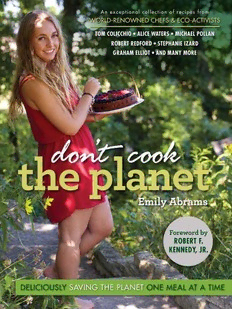
Don't cook the planet PDF
Preview Don't cook the planet
Photography by Stephen McDonald & Steven Karl Metzer Copyright © 2014 by Emily Abrams. All rights reserved. Photography © 2014 by Stephen McDonald & Steven Karl Metzer Cover image by Stephen McDonald Book design by Joline Rivera Food styling by Johanna Lowe Prop styling by Johanna Lowe No part of this book may be reproduced, stored in a retrieval system, or transmit- ted in any form by any means, electronic, mechanical, photocopying, or otherwise, without the prior written permission of the publisher, Triumph Books LLC, 814 North Franklin Street, Chicago, Illinois 60610. This book is available in quantity at special dicounts for your group or organization. For further information, contact: Triumph Books LLC 814 North Franklin Street Chicago, Illinois 60610 Phone: (312) 337-0747 www.triumphbooks.com Printed in the USA ISBN 978-1-60078-972-4 This FSC® certification ensures that all papers in this book were sourced in an environmentally responsible way. dedication To my mother for believing in this book and pushing me harder than anyone ever has. You have always stuck by me even when life got busy and stressful. You are an amazing person and an inspiration to all. I love you. Forever and ever. 3 table of contents 4 don’t cook the planet Introduction 6 Acknowledgments 10 Foreword by Robert F. Kennedy, Jr. 12 Soups & Starters 16 Salads & Sides 34 Entrees 82 Sweets, Treats & Other Eats 142 Index 174 5 introduction 6 don’t cook the planet My name is Emily Abrams; I am 18 years old and a senior at Deerfield Academy, in Deerfield, MA. I am very concerned about global warming and the impact it will have on the planet in the coming decades—from the disruption of weather patterns (which will cause more droughts, floods, and heat waves) to species extinctions and loss of biodiversity. I believe that if this problem goes unchecked climate change will be the defining issue of my lifetime. Climate change is a topic that has been a focal point of many discussions in my household (a household that happens to be powered by geo- thermal energy!). Being vocal about your beliefs and fighting for what is right is something that my parents instilled in me at a very young age. We’ve grown up fighting to make a difference and to change the world for the better. My mom started a non-profit organization to raise awareness of climate change when I was in grade school. Watching my mother fight to help protect the world in which I hopefully will grow old has given me the desire to do the same. I’ve also spent a lot of time over the past few years learning about the environment in my science classes at Deerfield. One course that played a major role in fueling my passion for activism was the AP Cambridge Global Capstone course that specifically focused on water and sustainability. We looked at issues from a local, international and global perspective. My interest in the environment really spiked from this class. I started noticing all of the misconceptions that people had. I was frustrated by the fact that people were unaware of the facts and instead were being told (even by some politicians) that climate change is a hoax. So what can we do about it? Well, we can all do our part. I wrote this book because I wanted to remind people that climate change isn’t just about melting glaciers and dying polar bears. It is a problem that will affect each of us where we live—in our communities, even at our dinner tables. I created this book to show people that the small things you do can help make a difference in the world. And it’s easier than most people think. 7 We think about the food we eat and we make choices—picking foods that are nutritious, or selecting foods in delicious combinations. Everything we eat is a choice. And all of our choices have consequences—if we pick foods that are high in protein, it builds muscles; if we pick foods that are high in sugar, we get quick energy. Our food choices also affect the planet. Everything we eat has a carbon footprint (or a term I prefer, “carbon foodprint”). Eating locally grown and organic fruits and vegetables will reduce the carbon footprint of the food we eat. Meat has a much higher carbon footprint than fish or chicken; you don’t have to be vegan, but perhaps one night each week you might choose to swap a meat dish for a pasta or vegetarian dish. This book isn’t about preaching or aspiring to perfection. This book is simply about mindfulness. It is about empowerment. Knowing that our choices can have a positive impact and doing what we can, when we can. Eating locally grown foods is not only good for the planet, and good for us—less distance from farm to table means the food is fresher and tastes even better. Throughout this book you will see how chefs, eco-activists, and many celebrities cook or eat sustainably. Doing the right thing for the planet doesn’t have to be a trade-off, as you will see from the delicious dishes in this book. I hope you enjoy the recipes! 8 don’t cook the planet of the author’s proceeds from the sale of this book will be donated to non-profit organizations committed to fighting for a more sustainable planet. 9
